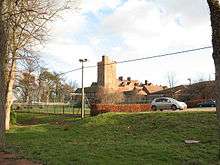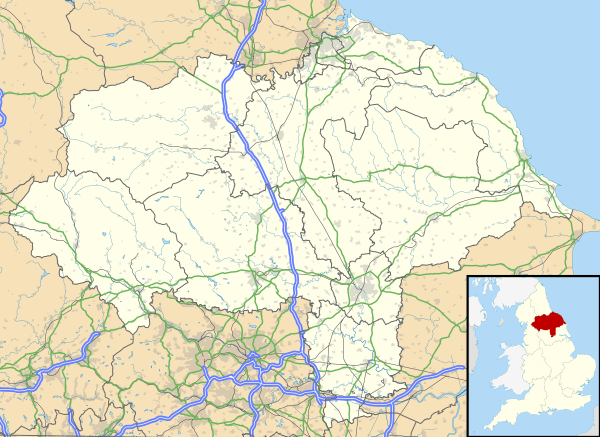Aysgarth School
Aysgarth School is an independent day and boarding preparatory school near to the village of Newton-le-Willows, North Yorkshire, England. As the name suggests, it was originally opened in the village of Aysgarth but was moved to Newton-le-Willows in 1890.
| Aysgarth School | |
|---|---|
 | |
| Location | |
 Aysgarth School Location within North Yorkshire | |
, DL8 1TF England | |
| Coordinates | |
| Information | |
| Type | Preparatory independent day and boarding school |
| Motto | Ex quercu non ex salice Latin: Of oak, not of willow |
| Religious affiliation(s) | Church of England |
| Established | 1877 |
| Founder | Reverend Clement Hales |
| School district | Richmondshire |
| Department for Education URN | 121738 Tables |
| Head teacher | Mr Rob Morse |
| Enrolment | 203 (141 boarders) |
| Capacity | 220 |
| Former pupils | Aysgarthians[1] |
| Admissions policy | Non Selective |
History
The school was opened in 1877 by the Reverend Clement Hales to prepare boys for a secondary school education. In 1890, the school moved to newly built premises costing £20,000 in the village of Newton-le-Willows but retained the name of Aysgarth School.[2][3] The chapel was a new building too, but contained items from elsewhere, such as the pulpit which was originally from Easby Abbey near Richmond.[4] Whilst the chapel on site is a listed building, the rest of the buildings remain unlisted due to a significant fire on site in 1933 which destroyed much of the school.[5][6]
The school is a preparatory school for selection to a range of private and independent schools across the United Kingdom and offers places to boys between the ages of 8 and 13 and also runs a pre-prep (or preparatory nursery) open to boys and girls between the ages of 3 and 7.[7] Its independent status means that it is assessed by the Independent Schools Inspectorate for reporting purposes rather than Ofsted.[8]
The school has been described as one of the leading prep schools for boys and the only single-sex school of its kind north of Oxford.[9][10] Its admissions policy is non-selective and fosters a culture of allowing boys to be boys in a safe but calming environment.[11] The school is one of many who allow pets into the class and Aysgarth School encourages Housemasters to allow their dogs into class.[10][12] The school's ethos is based on Christian values and principles, and as such, boarders are expected to attend services in the chapel on site for church services.[13]
The school's motto is Ex quercu non ex salice (Latin for of oak, not of willow) and former pupils are known as Aysgarthians.[14]
Notable Aysgarthians
- John Cracroft-Amcotts, former High Sheriff of Lincolnshire
- Sir (Henry) Grattan Bushe, Lawyer and colonial governor[15]
- George Butterworth, Composer and folk-dancer[16]
- Basil Guy, Victoria Cross recipient[17]
- David Ince, RAF pilot who flew 150 missions over Germany during the Second World War and who was awarded the DFC[18]
- James John Joicey, amateur entomologist who made significant contributions to the Natural History Museum's collection of Lepidoptera[19]
- Richard Meinertzhagen, Soldier and ornithologist[20]
- Matthew Pinsent, Olympic rower[21]
- Jonathan Ruffer, Philanthropist[22]
- Robert Swan, Polar explorer[22]
References
- Dooks, Brian (12 June 2009). "Battle of Britain veteran finally honoured on new school plaque". The Yorkshire Post. ProQuest 335317784.
- "Aysgarth new School and Chapel". The York Herald (12, 486). 11 June 1891. p. 6. OCLC 877360086.
- Speight, Harry (1897). Romantic Richmondshire. London: E Stock. pp. 340–341. OCLC 252008733.
- "Aysgarth School". The York Herald (14, 138). 28 September 1896. p. 2. OCLC 877360086.
- Historic England. "Chapel at Aysgarth School (Grade II) (1131416)". National Heritage List for England. Retrieved 22 February 2018.
- Historic England. "Aysgarth School (1448975)". PastScape. Retrieved 22 February 2018.
- Roberts, John (25 June 2009). "Toby following in footsteps of great Britons". The Yorkshire Post. ProQuest 335393855.
- "Aysgarth School". reports.ofsted.gov.uk. 5 November 2010. Retrieved 22 February 2018.
- The Gabbitas Top 500 Independent Schools A Guide to the Best in Private Education. London: Kogan Page Ltd. 2013. p. 164. ISBN 978-0-7494-7035-7.
- "Aysgarth School". tatler.com. 17 September 2016. Retrieved 22 February 2018.
- "Aysgarth School – Bedale". Darlington and Stockton Times. 10 July 2016. Retrieved 22 February 2018.
- Watkins, Flora (7 April 2015). "Pets at school: meet the 'the other boarders'". The Telegraph. Retrieved 22 February 2018.
- "Social care Inspection Report 2008" (PDF). reports.ofsted.gov.uk. 21 November 2008. p. 4. Retrieved 22 February 2018.
- Waugh, Tessa (Autumn 2014). "Paradise for Northern Boys". Country Life. School Life Magazine. Farnborough: Time Inc: 25. ISSN 0045-8856.
- Samuels, Alec (3 January 2008). "Bushe, Sir (Henry) Grattan (1886–1961)". Oxford Dictionary of National Biography (online ed.). Oxford University Press. doi:10.1093/ref:odnb/40718. Retrieved 22 February 2018. (Subscription or UK public library membership required.)
- Frogley, Alain (23 September 2004). "Butterworth, George Sainton Kaye (1885–1916)". Oxford Dictionary of National Biography (online ed.). Oxford University Press. doi:10.1093/ref:odnb/32222. Retrieved 22 February 2018. (Subscription or UK public library membership required.)
- Winton, John (2016). "4: Twentieth Century Operations". The Victoria Cross at Sea (2 ed.). Barnsley: Pen & Sword. p. 83. ISBN 978-1-47387-612-5.
- "David Ince". The Times. 24 August 2017. p. 58. ISSN 0140-0460.
- "MR. J. J. JOICEY Owner of £50,000 Collection of Butterflies". Yorkshire Post and Leeds Intelligencer. 12 March 1932. p. 14.
- Garfield, Brian (2008). The Meinertzhaen Mystery The Life and Legend of a Colossal Fraud. Dulles, Virginia: Potomac Books Inc. p. 43. ISBN 978-1-59797-160-7.
- "Fear of Olympic failure spurred on oarsman to medal triumph". The Yorkshire Post. 23 September 2004. ProQuest 335152838.
- Sedgwick, Phillip (21 April 2015). "Unlikely head has no regrets". Darlington and Stockton Times. Retrieved 21 February 2018.